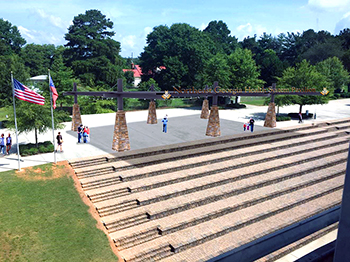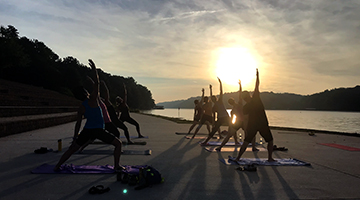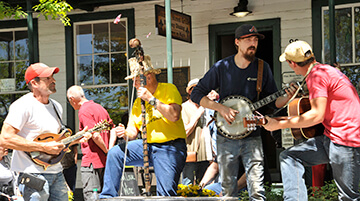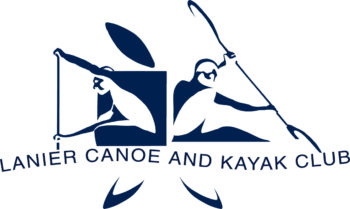
A rendering of the planned Plaza Pavilion at LLOP shows a possible design of the project.
In coming months construction at Lake Lanier Olympic Park will change the looks of the historic venue and open it up for more outdoor community activities. Early this year work is expected to begin on a plaza pavilion to cover a section of the stone plaza and grandstands to afford shelter from sun and rain. The upgrade is projected to increase tourism potential and provide more year-round opportunities for special occasion rentals and community events. It is the latest in a series of upgrades in the park’s evolution from its revered 1996 Olympic past to a vibrant lakeside gathering place.
“A covered area on the plaza has been the most requested improvement to the park from community and visitor surveys,” said Robyn Lynch, Gainesville tourism director. “Weddings, banquets, company picnics, concerts and more will be held at the park year-round, creating new opportunities for tourism and increased positive economic impact to Gainesville.”
“We recognize that the park has over 300,000 visitors each year – visitors use the plaza, park, beach and boat ramp 365 days a year,” Lynch said in an email. “In addition, the park creates an average of $5 million in economic impact annually through events that bring in tens of thousands of visitors and athletes to our community each year.” In recent years, LLOP has expanded its culture from primarily a rowing and paddling venue to a community destination for concerts, festivals, swimming competitions, triathlons, Food Truck Fridays, wakeboard contests, and boat shows.
The LLOP Foundation and tourism department secured pavilion funding from Northeast Georgia Health System, which donated $600,000 for a 10-year sponsorship that includes naming rights to the plaza and pavilion, branding on the LLOP website and marketing materials and six annual rentals. The Foundation, a revival of the original Gainesville-Hall ’96 which formed to bring Olympic canoe/kayak and rowing to Lake Lanier, launched a $1.5 million fundraising campaign at the venue’s 25th anniversary in August. The plaza is one of five capital improvements the Foundation wants at LLOP. Others include additional courtesy docks for public use, a one-mile loop walking trail with exercise components, new public art, and a complete re-make of the boathouse.
The proposed 50’ by 60’ steel and metal pavilion, designed by Roswell architectural firm Millard & Associates, will cover a top portion of the plaza and extend 15 feet into the grandstands, according to Lynch. It will also have a drop-down side to enhance versatility in any weather. It will accommodate about 250 people and still leave room for food trucks, vendors, team tents and emergency vehicles on the plaza level. As of mid-December, consultation with the architect was on-going and a contractor had not been assigned.
Park management has been researching how to create a covered space for several years, said LLOP Interim Manager James Watson. “Three years ago the park purchased a 30’ by 60’ tent in preparation for completion of the master plan and to run a test to see if a structure on the plaza was feasible and to what impact it had on events such as regattas,” he said. “What we found was the tent was used heavily and only made positive impacts on the events. During major regattas the majority of the teams only have room for athletes, coaches and other support staff and some do not want family and friends to enter their athlete areas. During the regattas we converted the tent into a seating, eating and escape from the sun area for spectators.” Attendees at concerts and other events also paid extra for table seating under the tent.
Watson said he and Lynch polled regatta attendees about a pavilion. “(Lynch) and I walked around to various teams, organizers and other key regatta staff to get their opinions on the structure and everyone was in favor of creating something more permanent. The pavilion will not change the overall layout of the plaza and will only have a positive impact on our regattas and other events, just as the tent did for those events,” Watson said.
It was not known how construction might affect any spring events at LLOP. As of mid-December, no large regattas were scheduled through the end of May. The American Collegiate Rowing Association website shows the organization will race its national championship in Oak Ridge, Tenn., not at LLOP, the predominate site for the event since 2008. The championship was canceled in 2020 and 2021 due to coronavirus concerns. As of last month, officials with the John Hunter Regatta, a large March weekend youth and college rowing competition traditionally held at LLOP, had not made public its 2022 plans.
The lack of major 2022 spring regattas during what appears to be a building year at LLOP fades in light of a crowning event coming in four years. The Foundation and Gainesville tourism organization eye the pavilion and other facility enhancements to prepare for the 2026 NCAA Women’s Rowing National Championship. In a letter proposing the NGHS sponsorship, Foundation Chair Mimi Collins and Lynch state that the city is set to invest an additional $17 million to LLOP prior to the NCAA event. That investment is expected to pay for a complete renovation of the boathouse, which was originally constructed as a temporary structure for the 1996 Olympics. The city funds LLOP through its hotel/motel tax.
NGHS officials agreed to donate for the pavilion after the Foundation approached them last year, according to Sean Couch NGHS director of communications and consumer strategy. “Our mission is to improve the health of our community in all that we do,” he said. He cited the park’s potential benefits to the community’s physical, mental and economic health. Beyond the physical exertion of rowing and paddling, the park “provides a lovely place for people to enjoy the lake with beautiful views and promotes tremendous mental health benefits,” he said. The economic boom expected from the NCAA championship and other LLOP events also contribute to the community’s overall health, he added.
Couch said last month he had no details about the name NGHS will give to the pavilion and plaza, but he suspected the branding would include the health system’s laurel leaf logo.
Asked what activities NGHS might host in its agreed upon six annual rentals, Couch mentioned board meetings, team building exercises and large-scale community events. He said some resident physicians had already participated in dragon boat team building programs.
Couch said the hospital system, which has IRS designation as a non-profit entity, is required to invest into other community non-profits, such as the LLOP Foundation. The NGHS Community Health Improvement Team recommended the investment.
It is the largest sponsorship for LLOP since the Foundation revived in 2013, the first being $250,000 from Fieldale Farms Corporation in 2015. That five-year renewable sponsorship helped pay for finish tower improvements before a 2016 canoe/kayak Olympic qualifier. The Fieldale deal emblazoned “Springer Mountain Farms” on a LED sign on the tower. Lynch said negotiations are under way with the poultry company to renew its commitment to LLOP.
The NGHS agreement also allows the health system other sponsorship opportunities for future picnic pavilions on the boathouse side of the park, fitness facilities, and public art locations. It states that no other health system would be eligible for these opportunities unless approved by NGHS.







